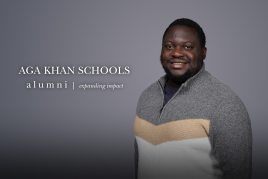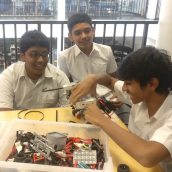Holi Meets Easter
Join us a for a colourful celebration on 22 March at 4pm on the Sports Field!
Cultural Night
Join us in celebrating our diversity at Cultural Night on Saturday, 28 November
“Creating leaders”: Impact of an Aga Khan Schools education
During his time at the Aga Khan Academy Mombasa, Ham Serunjogi (Class of 2012) – CEO and co-founder of African fintech giant Chipper Cash – realised the importance of staying connected to something larger than himself and giving back to the world. This fuelled his remarkable success, and recently, the Forbes 30 Under 30 honouree was selected to serve as an advisor to the US President on African diaspora engagement.
“A big part of it was that I was in the residential programme,” Ham says. “My roommates and my house parents were a central part of my experience; they practically became family to me.”Originally from Uganda, Ham became a part of the Academy’s residential programme, where students in Grades 6-12 from around the world live on campus and participate in different activities and leadership opportunities.
“The group of friends I had on the floor we lived on,” he continues, “I value those friendships deeply.”
Ham credits his dorm parent, Mr Bardai, as a large part of his amazing experience at the Academy.
“Mr Bardai was absolutely the best and looked out for me,” he said. “We remain close to this day.”
Along with his residential parents, Ham fondly recalls teachers such as Mr Kassam, who incorporated meals in his English lessons as they were described in books the students read in class, which encouraged the kids to bring in their own dishes for a potluck.
“We had a really fun time in class with Mr Kassam.”
Ham also recollects his role as President of the Academy’s Student Representative Council, which allowed him to lead the secondary school students and work closely with his peers and teachers.
“The Academies as a whole aim to instil in their education the notion of creating people who are leaders that can come back and help develop their local communities,” he explains. “The idea of being a net positive contributor to society – that was something I learnt strongly.”
“The more I think back on the ways the Academy made sure we were connected to the community, with the events we did outside of the Academy with other community members, that was a key reminder to not stay in an isolated group of privileged people or with people that aren’t connected to something larger than ourselves,” he explains.
“That really resonated with my time over there.”
From Kampala to Mombasa to Iowa
After completing the International Baccalaureate (IB) Diploma Programme at the Academy, Ham’s journey leaped to another continent when he moved to Iowa in the US to study economics at the prestigious Grinnell College.
He was ready for the adventure, thanking his move to the Academy in Mombasa from his hometown in Kampala, Uganda as an insight into what it is like to move away.
“[My time at the Academy] was the first time in my life I lived away from home,” he says. “It was like a nice trial period before moving further away.”
“I was excited to move to Grinnell, to Iowa, for all the big and small things like seeing snow for the first time,” he reflects. “Just being around a new environment, new culture and a new group of people was very exciting.”
The creation of Chipper Cash
Following his graduation from Grinnell and a two-year stint at Meta (formerly Facebook) came a pivotal stage in Ham’s life. In 2018, he and his co-founder Maijid Moujaled established Chipper Cash, a financial technology, or fintech, company offering several products and services to people in Africa, such as local and cross-border payments, cards, stocks, airtime and data, and bill pay.
“I wanted to make an impact on my local community with what I know best,” Ham says. “I wanted to create a solution that might solve a problem for people in Uganda.”
The CEO met his co-founder at Grinnell, who wanted to create a similar solution for the people of Ghana, where he was originally from.
“It was easy to align our thinking because we wanted to start the company to check some boxes – what needs to be done and where?”
Chipper Cash now has over five million customers operating in countries including Nigeria, Rwanda, Ghana, Uganda and the US. It has been featured in several global financial publications as well as news channels including BBC, CNN, Quartz, Apple and Forbes, in which Ham was named as one of the honourees of the Forbes 30 Under 30 Finance List of 2023.
Serving on the US President’s advisory council
In September 2023, Ham was appointed to serve on the Inaugural President’s Advisory Council on African Diaspora Engagement in the United States. The Advisory Council is tasked to advise the US President on a range of issues, including how to strengthen relations between Africa and the US, promote trade and investment, and build educational exchanges.
“I definitely pinch myself every night just to make sure I’m not dreaming,” he laughs. “If you’d ask me at any point in my life if I would ever be an advisor to the US President, there’s no way I’d have thought that’s possible.”
Ham highlights what he is most excited about for his role as an advisor.
“One, it’s an incredible group of people to be a part of,” he says. “And two, in today’s world, Africa is the fastest growing continent and they’re strong partners with the US. We will help advise the President to form policy and help drive US-African relations and investment further.”
“Policy is going to affect billions of people, and if we do our job well, we’ll make a positive impact on the world. If that’s all I ever do in my life, I’ll be very happy with myself.”
Giving back to the Academy
Ham feels fortunate to be in a position where he can give back to the place that started it all. The alumnus consistently provides the Academy in Mombasa with support by coming back to address graduates, creating videos and content to promote the Academy, or even donating to support current and future students.
“It’s a special place to me,” Ham describes. “I was fortunate enough to give the 2021 graduation commencement address, and the theme of my remarks was the realisation of the opportunities I’ve been lucky to receive, and the best way to repay them is to help repair the world.”
International Baccalaureate - Middle Years Programme
International Baccalaureate - Middle Years Programme
Rudra Potluri - dreaming up the future
Rudra has grown into himself since joining the Academy in 2013, most notably through the enrichment programme through which he discovered robotics and design. His work with robots stems from his enthusiasm for engineering, but Rudra has gone beyond just tinkering. “When I was learning robotics as part of enrichment, I never imagined that I would become captain of a robotics team,” said Rudra. Rudra captained a robotics team in January 2018 at the FIRST Lego League competition in Bengaluru. This was the first ever robotics competition that Academy students entered in.
“It didn’t stop there,” he continues, “the Academy provided a platform for me and my team to share our learning and knowledge with the community by letting us conduct a workshop for government schools.” Rudra was part of a team that hosted 48 grade six students for a day, teaching them about robotics and design. “The most unique thing about the Academy is that it doesn’t just stop at teaching, it makes sure that students apply their knowledge in the real world and give something back to society.” Rudra also participated in the Chinna Shodha Yatra, travelling around rural Andhra Pradesh to understand nuances of life in local communities.
In 2014, India's ambitious Mars Orbitor Mission came to fruition and Rudra had the opportunity to take part in a live telecast discussion about the mission on state TV. The following year, Rudra was selected as a Microsoft student ambassador and got to attend a workshop at the Microsoft headquarters in New Delhi. In grade 10, he used his MYP personal project as a chance to explore his interests in engineering and software and built a home automation system. "My aim was to make it for my grandparents, who are older and can’t move around as easily anymore,” he says about the Smarthome Automation System. His SAS, at ₹2,000 per room, is a cost effective alternative to existing systems in the market, which can cost upwards of ₹70,000. In the same year, Rudra showed initiative in his design project, choosing to build a quadcopter. The drone was created to support the Academy's existing security system.
In May 2018, outside robotics events, Rudra also headed the IT and design unit of the Academy’s first ever TEDx. It comes as no surprise then to know that Rudra is considering studying computer engineering after school. Rudra has applied to the Michigan Institute of Technology (MIT) in the USA, and the University of Waterloo, Canada.
Rudra earned a fellowship to spend the 2018 summer vacation in Ryerson University, Toronto, to take part in the Ryerson DMZ Sandbox Basecamp, a workshop for socially conscious young innovators. The urban university is a renowned research institution and we are positive Rudra's contribution will be significant and impactful.
Naheed Hirji Keynote Speech at 2016 Peace Summit
Naheed Hirji, Growth and Partnerships Manager at Facebook, Africa was one of the Keynote speakers at the Peace Summit 2016. Naheed has in the past worked with Microsoft, Zynga and various social enterprises that are using technology to make a positive change in the world. He currently works on growing internet penetration in Eastern and Southern Africa using Facebook’s free basics (Internet.org).
Naheed stirred an interesting discussion around the theme of using Internet as a tool for peace. He started off with a conversation around the question “Is internet a human right?” Students responded with some interesting claims including the fact that humans have lived without the Internet before so why can’t they now? However, some brought up the issue of censorship and how governments monitor the public, compromising privacy. A discussion on whether or not internet is a tool for peace followed. Opinion was split in the room at first. The proposers argued how awareness and fundraising for important causes can be done using social media while the opposing side argued that the internet has given birth to cyber bullying.
This discussion finally led up to Naheed sharing how he came to a conclusion about this and why he took the job at Facebook. Naheed was a technology geek growing up but wanted to make a difference using technology. When he was offered the job at Facebook, he was uncertain about the impact he would be able to make, so he used IKIGAI. IKIGAI is a Japanese concept meaning "a reason for being". Everyone, according to the Japanese, has an IKIGAI. Finding it requires a deep and often lengthy search of self. IKIGAI evaluation consists of 4 questions: Are you doing something that you love? Are you doing work or deeds that the world needs or will be better for? What is it that you are really good at? And finally, is it possible to monetize this? His job was going to be to grow internet users in Africa, but how would this benefit people and the world? He thought to himself, the internet is a breeding ground for cyber bullying, spreads false information and hate speech and reduces individual privacy. He used the examples of ISIS and the conflict between Apple and the US government. However, the internet has the incredible power to connect people around the world, enable friends and families to communicate, improve job creation, education and health care levels, gives us information on our fingertips and gives everyone a voice and the power to share their opinion. If he were to help launch free basics, it would make the internet accessible to more people by providing them access to a range of free basic services like news, maternal health, travel, local jobs, sports, communication, and local government information, assisting them to improve their lives. He was going to be able to use technology to make a difference in the lives of billions of people. When he took the job at Facebook, he was sure he had found his IKIGAI.
He believes the internet and technology can be used as a tool for peace. All that is required is a change of attitude, being informed and critical thinking. “We must strive to become responsible citizens of the internet, break cultural, societal and political barriers and engage in respectful dialogue.” he said. He ended by sharing the idea behind peace.facebook.com, which demonstrates friendship and understanding in the most unexpected places and which is what we must aim to achieve using the internet.
By Inaara Gangji, DP1 (The Reporters)
Pinto Belo João: A determined teacher and a collaborative planner
“Being a teacher is not easy, because we have to teach and learn every day. I chose a career in teaching because I like to share what I know with others, especially young people, to help them to overcome the challenges in life. Being a teacher is like taking care of something special, so I decided to take care of that special thing, walking together in order to discover the world around us.”
Pinto Belo João is a grade 2 teacher at the Aga Khan Academy in Maputo. Born in Maputo, Mozambique, Pinto attended a teacher training course in Matola in 2007 where he became a primary teacher and then attended Pedagogical University in 2011 to study education. He came to the Academy as part of the Teacher Preparation Programme (TPP), which was established by the Aga Khan Academies to train recent teacher graduates to become International Baccalaureate (IB) teachers.
“Honestly I didn’t know many things about the Academy before I joined, but I always was eager to learn and grow professionally,” says Pinto. Through the Aga Khan Academy, Pinto says he has grown professionally in terms of learning new approaches to teaching and learning, trying new things and giving himself a chance to learn more. “Through professional development, the Academy helped me become a more effective teacher and a collaborative planner,” he says proudly.For Pinto, the most rewarding aspect of the Aga Khan Academy is teaching while surrounded by experts. This environment has given him the opportunity to try new things and granted him time to reflect on teaching strategies. This has been both valuable and powerful for Pinto as it allowed him to share experiences related to classes and receive guidance and support from others. What Pinto really likes about the Academy is the integration of the Aga Khan Curricular Strands. “In my opinion these Strands make us unique and different from others,” he says.
Reflecting on enlightening experiences at the Academy, Pinto narrates a particular day when he was teaching mathematics through games. He says that while he was giving instructions on how to play the game he was surprised to see the students already playing the game before he could even finish explaining. “I learned something that day: we should never underestimate our students. Sometimes we think that we have to teach something, but the students already know it. We need to be careful in our approaches,” Pinto remarks.
In this way, Pinto has learnt profoundly from his students and feels that the teacher-student relationship, reinforced by trust, is of the utmost importance. “We need to establish trust so that the process runs toward success both inside and outside the classroom,” he says.Relationships in the classroom must also involve parents – Pinto knows the importance and necessity of parental involvement in the education of their children. He regularly updates the parents about what they do in class and about their school trips – he also ensures that he shows parents the newsletter with stories of learning from the classroom. Some of the homework Pinto assigns includes parent personal experiences that they can share with their children.
At the Academy, Pinto says they try as much as they can to involve all students in activities and give each of them a role in groups to make them appreciate each other’s abilities. “By promoting activities like social community, [this] makes the students reflect on their own actions,” he remarks. Pinto explains that students come from different backgrounds and nationalities and that this is what makes the residential environment multicultural and promotes pluralism. When the students are exposed to this environment, Pinto says, “They learn more from each other and respect diversity. It is a great experience for them.” Ensuring a climate of pluralism on campus is not an easy task, Pinto says. “But through student’s responsibilities, we can ensure that they are working together.”
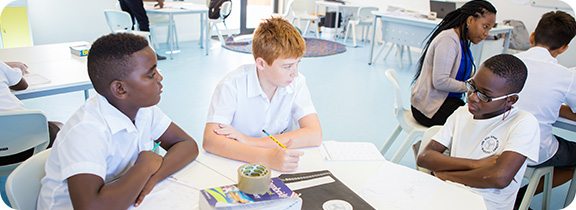
Primary Years Programme
The Aga Khan Academy Maputo has been accredited as an IB World School for the Primary Years Programme (Grades K–5).
Foundations for lifelong learning
The Primary Years Programme focuses on the development of the whole child. It is geared towards creating independent, confident and respectful learners.
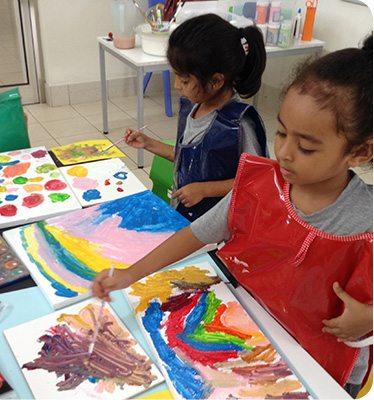 Our classroom curriculum and after-school activities address the children's social, physical, cultural and ethical development while giving them a strong foundation in all the major areas of knowledge.
Our classroom curriculum and after-school activities address the children's social, physical, cultural and ethical development while giving them a strong foundation in all the major areas of knowledge.
The curriculum consists of five essential elements:
- concepts
- knowledge
- skills
- attitude
- action.
The core subjects we cover include English language, mathematics, science and technology, and social studies. Our programme also includes a beginning computing course, physical education, music, art, French and Portuguese.
Students and teachers explore questions in all subject areas using an interactive, student-centred approach. The knowledge element of the curriculum is enhanced by six themes that are studied across the various subject disciplines. These are:
- who we are
- where we are in place and time
- how we express ourselves
- how the world works
- how we organise ourselves
- sharing the planet.
The PYP develops well-rounded students who are well versed in all areas of knowledge. They learn to be intellectually curious, principled, caring, open-minded, well balanced and reflective learners.
Please visit the Admission Requirements page or contact us to find out more about applying to the PYP at the Academy.
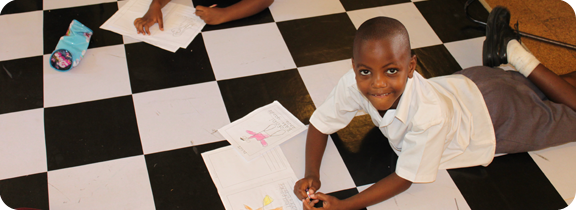
Primary Years Programme
The Junior School of the Aga Khan Academy, Dar-es-Salaam is preparing for authorisation as an International Baccalaureate (IB) World School offering the IB Primary Years Programme (PYP).
Foundations for Lifelong Learning
The Primary Years Programme focuses on the development of the whole child. It is geared towards creating independent, confident and respectful learners.
Our classroom curriculum and after-school activities address the children's social, physical, cultural and ethical development while giving them a strong foundation in all the major areas of knowledge.
 The curriculum consists of five essential elements:
The curriculum consists of five essential elements:
- concepts
- knowledge
- skills
- attitude
- action.
The core subjects we cover include English language, mathematics, social studies, science and technology. Our programme also includes a beginning computing course, physical education, music, art, French and Portuguese.
Students and teachers explore questions in all subject areas using an interactive, student-centered approach. The knowledge element of the curriculum is enhanced by six themes that are studied across the various subject disciplines. These are:
- who we are
- where we are in place and time
- how we express ourselves
- how the world works
- how we organise ourselves
- sharing the planet.
The PYP develops well-rounded students who are well versed in all areas of knowledge. They learn to be intellectually curious, principled, caring, open-minded, well balanced and reflective learners.
Please visit the Admission Requirements page or contact us to find out more about applying to the PYP at the Academy.
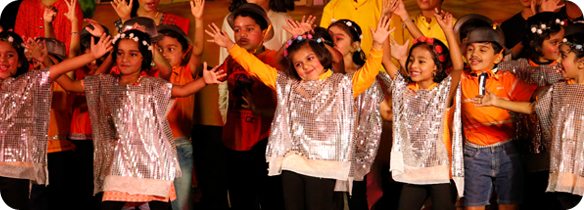
Primary Years Programme
The Junior School of the Aga Khan Academy Hyderabad is an International Baccalaureate World School and has been authorised for the Primary Years Programme (PYP).
Foundations for lifelong learning
We offer the PYP for students in grades 1–5 (aged 6–10). The programme focuses on the development of the whole child. It is geared towards creating independent, confident and respectful learners.
Our classroom curriculum addresses the children's social, physical, cultural and ethical development while giving them a strong foundation in all the major areas of knowledge.
The curriculum consists of five essential elements:
- concepts
- knowledge
- skills
- attitude
- action.
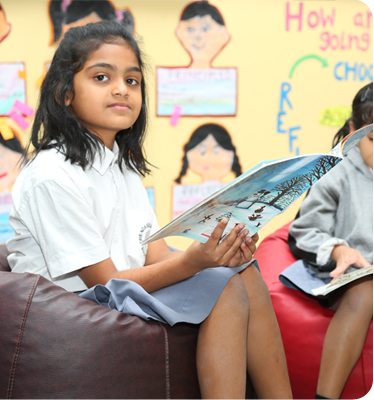 The core subjects we cover include English language, mathematics, social studies, science and technology. Our programme also includes a beginning computing course, physical education, music, art and Hindi.
The core subjects we cover include English language, mathematics, social studies, science and technology. Our programme also includes a beginning computing course, physical education, music, art and Hindi.
Students and teachers explore questions in all subject areas using an interactive, student-centred approach. The knowledge element of the curriculum is enhanced by six themes that are studied across the various subject disciplines. These are:
- who we are
- where we are in place and time
- how we express ourselves
- how the world works
- how we organise ourselves
- sharing the planet.
These transdisciplinary themes of global significance are addressed through six units of inquiry at each grade level, and this forms the school’s programme of inquiry. The programme of inquiry is the conceptual curriculum framework for the PYP. The transdisciplinary themes ensure that they are "revisited throughout the students’ years of PYP so that they are immersed in broad ranging, in-depth, articulated curriculum content” (Making the PYP Happen: A curriculum framework for international primary education).
The PYP develops well-rounded students who are well versed in all areas of knowledge. They learn to be intellectually curious, principled, caring, open-minded, well balanced and reflective learners.
Please visit the Admission Requirements page or contact us to find out more about applying to the PYP at the Academy.
